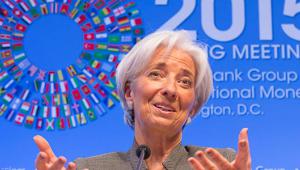The fund said today that it expects the eurozone’s economy to grow by 1.6% this year and 1.4% in 2017, down from estimates of 1.7% for both this year and next made before the UK’s 23 June referendum.
The downgrade was “mainly due to the negative impact of the UK referendum outcome”, the fund said.
The IMF was one of a number of institutions to warn that Brexit would have negative economic consequences, sparking uncertainty and knocking confidence in the UK, EU and global economy.
But presenting the IMF’s regular review of the euro area today, Mahmood Pradhan, deputy director of the European department, stressed that the results were an early assessment.
The IMF’s modelling was based on the UK reaching an agreement with the EU similar to that of Norway, which would see the country continue to have access to the single market.
While this would be the economically logical option, the EU has expressed reluctance to give the UK access to the single market without securing freedom of movement for EU citizens – a feature of EU membership that was widely and passionately rejected by leave voters in the UK.
Other risks also threaten the already weak outlook. The IMF said: “Further spillovers from the UK post-referendum situation, the refugee surge or a heightening of security concerns could contribute to greater uncertainty, hurting growth and hindering progress on policies and reforms. Moreover, prolonged low growth and inflation themselves make the euro area increasingly vulnerable to shocks.”
It noted that longer term prospects too are “mediocre”, with legacies from the 2008 financial crisis, including unemployment, high public and private debt and “deep-rooted structural weaknesses” weighing on growth and productivity.
As a result, the IMF expects growth in the eurozone to reach only 1.5% in five years time.
The Washington-based fund’s executive board called for “strong collective actions to boost growth and strengthen the union”, at a time when the bloc is perhaps the most divided it has ever been.
The loss of one of its most powerful members, a rise in anti-EU sentiment, and differences on how to deal with the refugee crisis and a weak economy have all destabilised relations between the bloc’s 28 members.
But IMF executive directors said that without “decisive actions, the euro area will remain vulnerable”.
They stressed the need for a number of reforms, including in fiscal governance, public administration and labour tax, and for a “balanced policy mix” and “growth-friendly fiscal rebalancing”.
“Access to any new central fiscal support could be conditional on implementation of structural reforms and compliance with fiscal rules,” they suggested.












